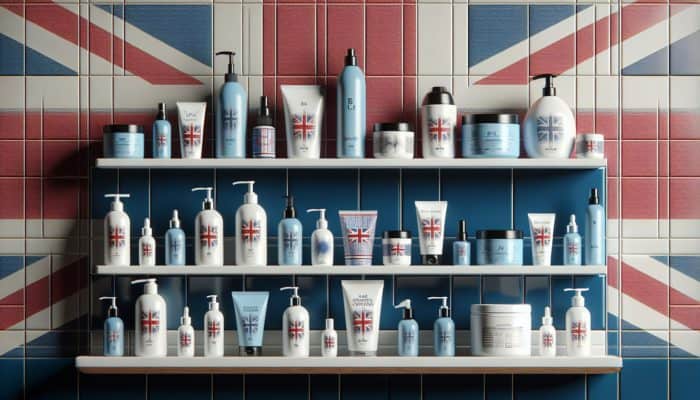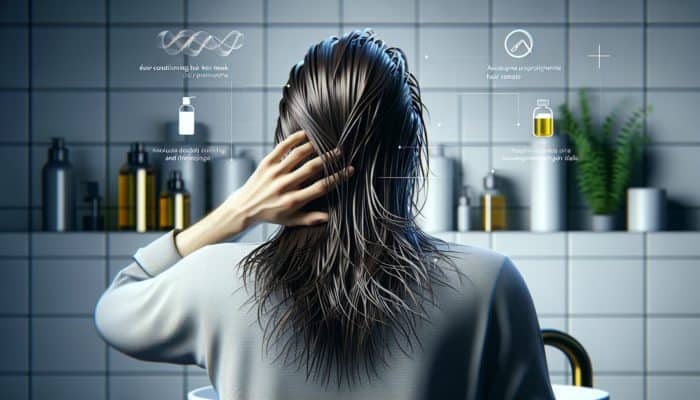Discover How to Identify Your Distinct Hair Type for Personalised Care
Embarking on your hair care routine in the UK necessitates a profound comprehension of your hair type, as this knowledge is crucial to achieving effective results. Just as a driver must understand the mechanics of their vehicle, it is equally important to grasp the complexities of your hair. Start by closely examining your hair’s texture, density, and porosity. Recognising these traits is vital; it allows you to tailor your hair care regimen to suit your individual needs. This level of understanding turns the process of initiating a hair care routine into a fulfilling and manageable journey.
Exploring the Key Characteristics That Define Your Hair

To develop a thorough understanding of your hair type, start by analysing its texture. Is your hair straight, wavy, curly, or coily? Each of these hair textures possesses its unique characteristics and maintenance needs. For example, straight hair typically requires less moisture compared to curly hair, which generally tends to be drier as natural oils struggle to travel efficiently down the hair shaft. Furthermore, evaluate the density of your hair; do you have thick, medium, or fine strands? This element influences how well your hair holds various styles and dictates your washing frequency. Additionally, porosity determines how effectively your hair absorbs and retains moisture; low-porosity hair tends to resist moisture, while high-porosity hair absorbs it rapidly, making it more prone to damage. Understanding these qualities is essential in selecting the right products to support your hair care routine.
In-Depth Examination of the Four Main Hair Types and Their Individual Needs
Having established the foundational concepts, let’s take an extensive look at the four primary <a href="https://limitsofstrategy.com/hair-types-unlocking-better-treatment-solutions/">hair types</a>. Straight hair often exhibits a sleek and shiny appearance but may sometimes seem lifeless without appropriate products to enhance its vibrancy. Wavy hair achieves a harmonious balance, offering both volume and texture, making it one of the most adaptable hair types. Curly hair is defined by its substantial body and bounce, yet it is more susceptible to frizz without proper care. Lastly, coily hair is highly textured, requiring additional moisture and meticulous attention to avoid breakage. Understanding the specific needs of each hair type is essential in choosing suitable products, ensuring that your hair care journey is not only effective but also enjoyable.
Valuable Insights: The Significance of Professional Guidance from Hair Experts
While self-assessment holds value, the insights provided by a professional hairstylist can offer unparalleled expertise. A stylist can conduct a comprehensive evaluation of your hair type and provide personalised recommendations tailored specifically to your unique requirements. They can suggest particular products and techniques that you may not have previously considered, ensuring that your hair care regimen yields the best possible results. Many salons offer consultations, so take advantage of this opportunity, particularly if you find yourself feeling overwhelmed by the vast array of products available on the market.
Identifying the Essential Hair Care Products for Maximum Efficacy

Selecting the right products is vital to the success of your hair care routine. Without the appropriate regimen, even the most dedicated efforts can fall short. Understanding which essential hair care products best align with your specific hair type is a critical step in establishing a hair care routine in the UK that truly delivers visible results.
How to Select the Ideal Shampoo Tailored to Your Hair Type
Choosing the right shampoo is a fundamental aspect of any successful hair care routine. Different hair types necessitate distinct formulations to thrive. For instance, if you have oily hair, a clarifying shampoo that effectively removes excess oil and product build-up is essential. Conversely, dry hair significantly benefits from hydrating shampoos specifically designed to infuse moisture. Look for nourishing ingredients such as aloe vera or coconut oil, which cleanse while providing hydration. Additionally, consider the health of your scalp; those experiencing dandruff should seek shampoos containing anti-fungal properties, while individuals with sensitive scalps may prefer gentle, sulfate-free options that cleanse without causing irritation or discomfort.
The Crucial Role of Conditioning in Sustaining Hair Health
Conditioning is an essential component of maintaining hair health. A high-quality conditioner works to restore moisture, making your hair more manageable and easier to style. It’s vital to select a product that suits your hair type. For example, fine hair may benefit from lightweight conditioners that won’t weigh it down, whereas thicker, coarser hair might require richer, creamier formulations to ensure sufficient moisture retention. Incorporating a conditioner into your daily routine not only enhances the texture of your hair but also fortifies strands against damage caused by styling tools and environmental factors, promoting long-term hair health and vitality.
Enhancing Your Hair Care Routine with Additional Treatments

To take your hair care routine to the next level, consider incorporating additional treatments such as hair masks or nourishing oils. These products specifically target issues such as dryness, damage, or lack of shine. For instance, a deep conditioning mask can work wonders for brittle hair, while a nourishing oil can assist in taming frizz and protecting against heat damage. Regular utilisation of these treatments can significantly enhance your hair’s overall health and appearance, making them indispensable elements of your hair care arsenal.
Utilising Leave-In Conditioners for Daily Hydration and Protection
Leave-in conditioners can be transformative in sustaining moisture throughout the day. They provide continuous hydration and protection, particularly beneficial for individuals with curly or coily hair types that tend to dry out quickly. When choosing a leave-in conditioner, opt for products enriched with proteins and hydrating ingredients such as shea butter or jojoba oil. Applying a leave-in conditioner following your wash can aid in detangling hair, minimising frizz, and creating a protective barrier against environmental stressors. This simple addition to your routine can help ensure your hair remains healthy, hydrated, and visually stunning.
The Critical Importance of Heat Protectant Sprays During Styling
Before using any heat styling tools, it is imperative to apply heat protectant sprays. These products establish a barrier between your hair and the damaging effects of heat, preserving the integrity of your strands. Select a protectant tailored to your hair type; for instance, fine hair may benefit from a lightweight spray, while thicker hair might require a cream formulation for enhanced protection. Applying a heat protectant not only shields your strands but also improves your styling outcomes, ensuring your hair looks fabulous while feeling fantastic.
Establishing Effective Daily Hair Care Practices for Long-Lasting Impact
Creating a consistent daily routine is essential for maintaining hair health, particularly when establishing a hair care routine in the UK. Implementing effective practices can significantly enhance your hair’s condition, allowing it to feel vibrant and look its absolute best.
Determining Your Ideal Washing Frequency Based on Hair Type
The frequency with which you wash your hair should be customised according to your hair type, scalp condition, and lifestyle. Oily hair may necessitate more frequent washing, potentially every other day, while dry or textured hair might require washing only once a week. Over-washing can strip your hair of its natural oils, leading to dryness, while under-washing can result in product build-up and dandruff. It is essential to listen to your hair and adjust your washing schedule based on its response and condition over time.
Implementing Proper Washing Techniques for Optimal Hair Health
The method you employ to wash your hair significantly impacts its overall health. Begin by thoroughly wetting your hair with warm water to open the cuticles, facilitating effective cleansing. Employ a small amount of shampoo, concentrating on the scalp, and allow the lather to cleanse the lengths of your hair as you rinse. Avoid piling your hair on top of your head, as this can lead to tangles and breakage. Follow up with a conditioner, applying it primarily to the mid-lengths and ends to avoid greasiness at the roots. Rinse thoroughly and consider finishing with a cold rinse to seal the cuticles, enhancing shine and smoothness.
Choosing the Best Drying Techniques to Preserve Hair Health
The method you select to dry your hair can have significant effects on its health and appearance. While air drying is the gentlest approach, it may take considerable time, especially for thicker hair types. If blow drying is your preferred method, ensure you utilise a heat protectant and a nozzle attachment for focused airflow. Always dry your hair gently, avoiding vigorous rubbing with a towel, as this can contribute to frizz and breakage. Instead, consider using a microfiber towel or an old t-shirt to absorb excess moisture without causing damage. By adopting mindful drying practices, you can notably enhance your hair's health and appearance over time.
Styling Your Hair Without Compromising Its Integrity
Styling your hair should not compromise its health. With the right techniques and tools, you can achieve your desired look while safeguarding your hair’s integrity. Mastering the art of styling and protecting your hair is crucial when learning how to start a hair care routine in the UK.
Selecting the Appropriate Styling Tools Tailored for Your Hair Type
Choosing the right styling tools is crucial to minimising damage to your hair. Always opt for high-quality products that cater specifically to your hair type. For instance, if your hair is coarse, a wide-toothed comb can help prevent breakage, while those with fine hair may benefit from a fine-toothed comb for precise styling. When it comes to heat tools, seek those with adjustable temperature settings, as excessive heat can be detrimental to your hair’s health. Investing in quality products can drastically reduce the risk of damage, allowing your hair to not only look fabulous but also remain healthy and strong.
Mastering a Variety of Styling Techniques for Beautiful Hair
Learning various styling techniques can significantly enhance your hairstyling capabilities. Blow-drying, curling, and straightening each require specific methods to minimise damage effectively. For blow-drying, use a round brush to lift the roots and create volume. A flat iron should only be applied to dry hair, ideally with a heat protectant to shield against damage. Curly hair may benefit from curl-enhancing creams applied to wet hair before diffusing to achieve defined curls. Experimenting with different techniques will help you discover what works best for your hair type, and always bear in mind that less is more concerning heat exposure and manipulation.
Embracing Protective Hairstyles to Foster Hair Health
Protective hairstyles serve as an excellent method to offer your hair a break from daily styling and manipulation. Styles such as braids, buns, or twists not only shield your hair from environmental stressors but also diminish the need for heat and styling products. These styles can help prevent breakage and promote overall hair health. It is essential to alternate styles to avoid placing excessive tension on any single area of your hair and to ensure that protective styles are executed gently to minimise stress on your strands.
Committing to Regular Hair Maintenance for Optimal Health
Establishing a routine of regular hair maintenance is crucial for ensuring long-term hair health. This includes incorporating conditioning treatments, oil applications, and scheduling regular trims to maintain optimal hair vitality. Tailor conditioning treatments to your hair type, while nourishing oils such as argan or coconut oil can help protect and nourish your strands. Regular trims every 6-8 weeks are vital in preventing split ends from travelling up the hair shaft, keeping your hair looking fresh and healthy. By committing to your hair’s health, you will be rewarded with vibrant, beautiful locks.
The Significant Effect of Nutrition on Hair Health
Your dietary choices exert a profound influence on the quality of your hair. A well-balanced diet serves as the cornerstone of your hair care routine. Understanding the link between nutrition and hair health is essential in establishing a hair care routine in the UK.
Constructing a Nutrient-Rich Diet to Enhance Hair Growth
Your hair thrives on a diet rich in vitamins and minerals. Incorporate foods that are high in protein, as hair is primarily composed of this essential nutrient. Sources such as fish, eggs, and legumes provide the necessary building blocks your hair needs to grow strong and healthy. Furthermore, omega-3 fatty acids found in fatty fish like salmon or flaxseeds can enhance scalp health and stimulate growth. A balanced diet that includes a variety of fruits, vegetables, nuts, and seeds will ensure that your hair receives the essential nutrients it needs for optimal growth and vitality.
Recognising the Critical Role of Hydration in Hair Health
Maintaining sufficient hydration is a fundamental yet often overlooked aspect of achieving healthy hair. Water is vital for your overall health, including the condition of your hair. Individuals who are dehydrated frequently notice an increase in dryness and brittleness in their hair. Aim to consume at least eight glasses of water each day. Proper hydration will help keep your scalp moisturised, facilitating optimal hair growth and reducing the likelihood of breakage. You might also consider complementing your hydration efforts with hydrating foods, such as cucumbers, oranges, and leafy greens, to further enhance your intake.
Utilising Supplements and Vitamins to Improve Hair Health
At times, it can be challenging to obtain all necessary nutrients from food alone, particularly for those with dietary restrictions. Supplements can help bridge these gaps, especially those rich in biotin, zinc, and vitamins A and C, which are renowned for their benefits to hair health. Always consult a healthcare professional prior to commencing any new supplement regimen to ensure it aligns with your specific health needs. A holistic approach that combines a nutritious diet, proper hydration, and suitable supplements will foster an environment that encourages luscious, healthy locks.
Addressing Common Hair Concerns with Practical Solutions
Even with the best of intentions, common hair issues can arise, impacting your overall experience. Knowing how to manage these challenges can streamline your journey towards an effective hair care routine. Understanding the obstacles you might encounter when learning to start a hair care routine in the UK empowers you to take proactive measures.
Practical Strategies for Effectively Managing Dandruff
Dandruff can be a persistent issue that detracts from your hair's overall appearance, but effective management is entirely achievable. Employ anti-dandruff shampoos containing active ingredients such as zinc pyrithione or salicylic acid to significantly reduce flakes and soothe irritation. Additionally, maintaining a clean and balanced scalp is crucial. Regularly exfoliating your scalp to remove build-up, along with balancing your washing routine, will help avoid over-drying. Incorporate mild shampoos and conditioners to ensure your scalp retains its natural moisture while keeping flakes at bay.
Identifying and Addressing the Causes of Hair Loss
Experiencing hair loss can be distressing, but understanding its underlying causes is the first step toward finding a resolution. Factors such as genetics, hormonal imbalances, and nutritional deficiencies can contribute to thinning hair. Consulting with a healthcare professional or dermatologist is advisable to explore potential treatments, which may encompass topical solutions, dietary adjustments, or supplements. Furthermore, implementing lifestyle changes such as stress management and regular scalp massages can encourage hair growth, providing a holistic approach to addressing hair loss.
Preventing and Effectively Treating Split Ends
Split ends are a common nuisance, but prevention is key to minimising their occurrence. Make a commitment to regular trims, ideally every 6-8 weeks, to maintain healthy ends and prevent splits from travelling up the hair shaft. In the interim, utilise products specifically designed to prevent split ends, such as leave-in conditioners or serum treatments that coat and protect your strands. Additionally, limiting heat styling to once or twice a week can significantly reduce damage, ensuring your hair remains strong and healthy.
Effective Strategies for Combating a Dry Scalp
A dry scalp can lead to discomfort and flakiness, yet it can be efficiently managed with the right approach. Regularly moisturise your scalp with hydrating shampoos and conditioners, and incorporate scalp oils that nourish and hydrate. Look for products containing ingredients such as tea tree oil or peppermint, which can help soothe irritation and promote circulation. Adjust your washing routine to prevent stripping your scalp of its natural oils, and consider incorporating scalp massages to enhance blood flow and nourish the roots.
Implementing Effective Management Techniques for Oily Hair
Managing oily hair can be frustrating, but there are effective strategies to help you control it. Frequent washing with a clarifying shampoo will eliminate excess oil and product build-up. Incorporate oil-absorbing products, such as dry shampoos or powders, to minimise greasiness between washes. Additionally, pay attention to your diet; reducing sugary and greasy foods can help lower oil production. Embracing a consistent routine will keep your hair looking fresh, vibrant, and healthy.
Developing Long-Term Strategies for Hair Care Success
Taking a long-term approach to hair care is essential for sustaining its health and beauty. Understanding how to maintain your hair over time is crucial when establishing a hair care routine in the UK.
The Importance of Regular Trimming for Healthy Hair
Scheduling regular trims is a fundamental aspect of maintaining your hair's health. Aim for a trim every 6-8 weeks, as this helps prevent split ends from travelling up the hair shaft, keeping your hair looking fresh and vibrant. Though it may seem counterintuitive, trimming off damaged ends encourages healthy growth and ensures your hair retains its vitality. Regular trims also enhance the overall appearance of your hair, making it easier to style and manage effectively.
Adapting Your Hair Care Routine to Seasonal Changes
Your hair care routine should evolve with the shifting seasons. During colder months, when the air tends to be particularly dry, prioritise hydration. Opt for richer conditioners and hydrating masks to combat dryness effectively. Conversely, during the summer, consider lighter products to prevent excess build-up from humidity. Remain observant of how your hair reacts to seasonal changes, and adjust your products and routines accordingly. This proactive approach will ensure your hair remains healthy and beautiful throughout the year.
Establishing a Consistent and Sustainable Hair Care Routine
Creating a sustainable hair care routine necessitates consistency and dedication. Begin by establishing a weekly regimen that includes washing, conditioning, and treatments specifically tailored to your hair type. Adhere to this routine, making adjustments only as necessary based on your hair’s response over time. Remember, hair care is not a one-time fix but rather a lifelong commitment. Embrace the process, and witness your hair transform into the healthy, beautiful locks you’ve always desired.
Frequently Asked Questions About Effective Hair Care
What is the recommended frequency for washing my hair based on its type?
The frequency of washing largely depends on your specific hair type. Oily hair may require washing every other day, while dry or curly hair often benefits from washing just once a week.
What is the best method for drying my hair while maintaining its health?
Air drying is the gentlest method for drying hair, while blow drying should be approached with caution—always use a heat protectant and a nozzle for targeted airflow to minimise damage.
What should I consider when choosing a shampoo for my hair type?
Select a shampoo that caters specifically to your hair type; clarifying shampoos work best for oily hair, hydrating options for dry hair, and gentle formulations for sensitive scalps.
Can my diet impact the overall health of my hair?
Absolutely! A diet rich in proteins, vitamins, and healthy fats supports hair growth and overall health, while proper hydration is crucial for maintaining moisture levels in your hair.
What are protective hairstyles, and why are they important for hair health?
Protective hairstyles, such as braids or buns, help shield your hair from environmental stressors and reduce daily manipulation, thereby promoting overall hair health and minimising the risk of damage.
How can I effectively prevent split ends from occurring?
Regular trims every 6-8 weeks combined with the use of leave-in conditioners can significantly help in preventing split ends, ensuring your hair looks healthy and well-maintained.
What steps can I take to manage dandruff effectively?
Utilise anti-dandruff shampoos containing active ingredients like zinc pyrithione and maintain a clean, balanced scalp through regular cleansing to keep dandruff at bay.
What strategies can I implement to manage my oily hair effectively?
Wash your hair frequently using a clarifying shampoo, incorporate oil-absorbing products, and be mindful of your diet to reduce excess oil production in your scalp.
Are supplements necessary for maintaining optimal hair health?
Supplements can be beneficial if your diet lacks essential nutrients. Focus on those rich in biotin, zinc, and vitamins A and C, which are particularly advantageous for supporting hair health.
How can I ensure my scalp remains adequately hydrated for healthy hair growth?
Utilise hydrating shampoos and conditioners, incorporate oils specifically designed for the scalp, and avoid over-washing to maintain moisture levels and minimise dryness effectively.
Connect with us on Facebook for more hair care tips!
The Article: How to Start a Hair Care Routine in the UK: A Guide appeared first on Amitys Hair Salon.
The Article Start a Hair Care Routine in the UK: Your Essential Guide Was Found On https://limitsofstrategy.com

